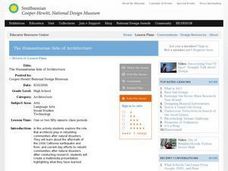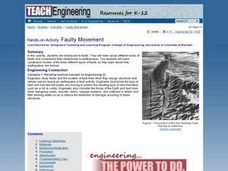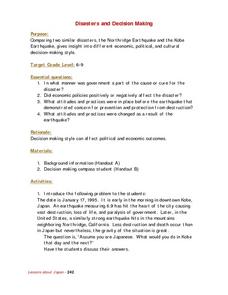Curated OER
Hazards: Kindergarten Lesson Plans and Activities
The last unit in the series allows kindergarteners to see the dangers and hazards associated with each of the natural disasters learned so far in the series—earthquakes and volcanoes. They listen to sounds associated with the...
Curated OER
1906 Earthquake
Students explore the impact of the 1906 earthquake on the population of San Jose. They explore two different perspectives of earthquakes. Students write a news bulletin as if they were reporting on the earthquake. They are then...
Curated OER
Whole Lotta Shaking Going On
Students explore earthquake activity in California. They observe the historical data and create databases and graphs of the earthquakes. Students analyze the data and form a hypothesis about future earthquakes.
Curated OER
Examing the San Francisco Earthquake
Students analyze photographic data about the San Francisco earthquake for evidence of its cause and effect. they determine if damage was caused by the earthquake itself or the ensuing fire. They role-play as earthquake survivors and...
Curated OER
The Fault Line
Students use cardboard models of the North American and Pacific plates and sand to investigate what happens when there is an earthquake or movement along the boundaries of the plates.
Curated OER
The Humanitarian Side of Architecture
High schoolers explore the role that architects play in rebuilding communities after natural disasters. They investigate the aftermath of the 1906 California earthquake and fires, and current day efforts to rebuild communities after...
Curated OER
Earth Science: In Depth Look at Earthquakes
Young scholars engage in an interactive Internet lesson covering the reasons and results of earthquakes. After reading eyewitness accounts and viewing animations, they use seismograms to measure and locate the epicenters. In an ongoing...
Channel Islands Film
Island Rotation: Lesson Plan 1
How do scientists provide evidence to support the theories they put forth? What clues do they put together to create these theories? After watching West of the West's documentary Island Rotation class members engage in a series of...
Science Matters
A Model of Plate Faults
The San Andreas fault is one of the longest fault zones in the world. In a series of 20 lessons, the fourth lesson has pupils use a paper model to recreate various types of plate faults. Each is held in position then drawn...
Curated OER
Dangerous Earth
Students view a Dangerous Earth video and research a historic or recent earthquake. In this earthquake lesson students create a piece of are to portray the experience of their particular earthquake.
Curated OER
Moving the Earth
Fifth graders simulate the three primary types of fault movement lateral fault, reverse fault, and normal fault by positioning their hands and applying pressure to them to observe the similar action taking place in the Earth's crust.
Curated OER
In Harm's Way: Natural Disasters in My Community
Eleventh graders research and debate natural disasters that have occurred in their community. They assess whether these natural disasters were avoidable or were accidents. They investigate the extent of insurance coverage for disasters.
Curated OER
Earthquakes on the Surface
Students view topographic or relief maps of Southern California and discuss what they see. They make predictions based on the topography of the region.
Curated OER
Earthquake Unit
Eighth graders watch the "Earth, the Environment & Beyond" video on earthquakes. Take notes and give an oral summary. They build a working, two dimensional model of a strike-slip, thrust, or normal fault.
Curated OER
Shake, Rattle and Erupt
Students study myths regarding four earthquakes myths. They receive a list of supplies each family should have at home to prepare for an earthquake and construct an "Earthquake Preparation" poster showing some of the most important items...
Curated OER
Learning from history: can it save lives?
Students research and document lessons learned from this disaster, then compile and synthesize information. They write effectively for public education purposes and use visual communications tools
Curated OER
Faulty Movement
Students discover the faults throughout the Earth. They describe the different types of faults and how they are related to earthquakes. They build models of the faults.
Curated OER
But They Never Told Me!
Students investigate how government legislates the protection of citizens from natural disasters such as earthquakes in California. They read the Alquist-Priolo Special Studies Act and debate its pros and cons. They discuss how much...
Curated OER
Disasters and Decision Making
Students compare the Northridge and Kobe earthquake. In groups, they identify the economic, political and culture decisions that were made according to the various cultures. They answer discussion questions and share their answers with...
Curated OER
Fault Features
Students discuss the different kinds of faults in the earth's crust and examine photos of the San Adreas Fault. Working in groups, they experiment with fault making by placing fabric in a pan and filling the inside with wet dirt. When...
Curated OER
Incorporating 3D Visualizations into Your Classroom
Students make observations through 3-D visualizations. They explore scientific and geologic processes through the use of 3-D pictures.
Curated OER
Two Rivers Ran Through It
Sixth graders discover the problems that early Mesototamian farmers faced while developing agriculture in the land between the Tigris and Euphrates Rivers. They design a working model that solves those unique challenges.
Curated OER
Volcanoes and People
Students discover that volcanic eruptions are geologic events that take place within the upper part and on the surface of the Earth's lithosphere. They explain how volcanoes are related to the Earth's lithosphere. They focus on the May...
University of Southern California
Wave Erosion Lab
Using a stream table, erosion enthusiasts examine how the density of sediment and how the slope of land contribute to the amount moved by waves. You will not be able to use this entire resource as is; there are teachers' names and...

























